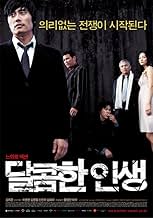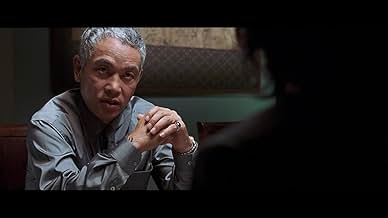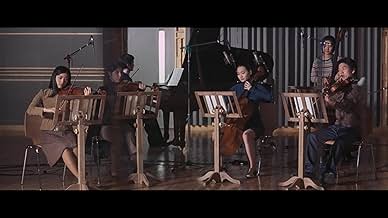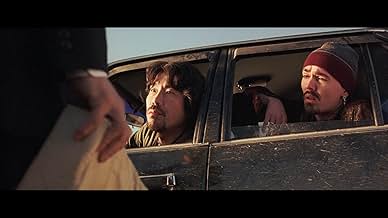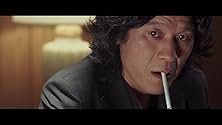IMDb RATING
7.5/10
44K
YOUR RATING
Things go wrong for a high ranking mobster when he doesn't follow his boss's orders.Things go wrong for a high ranking mobster when he doesn't follow his boss's orders.Things go wrong for a high ranking mobster when he doesn't follow his boss's orders.
- Awards
- 8 wins & 14 nominations total
Kim Yeong-cheol
- Mr. Kang
- (as Kim Young-Chul)
Hwang Jung-min
- President Baek
- (as Jeong-min Hwang)
Kim Roe-ha
- Mun-suk
- (as Roe-ha Kim)
Kim Hae-gon
- Weapon smuggler
- (as Hae-gon Kim)
Eric Moon
- Gun Dealer's Brother
- (as Eric)
Storyline
Did you know
- TriviaThe Korean title "Dalkomhan Insaeng" and the name of the bar "La Dolce Vita" translate to "The Sweet Life". As an ironic touch the International English title is called "A Bittersweet Life".
- GoofsToward the end of the film, when Kim Sun-woo is walking down the corridor searching for his former boss, a guard sitting and reading a newspaper gets up to stop him. Kim Sun-woo shoots him but his gun is not pointed at the guard. Rather, it is clearly pointed at the wall where fake blood appears after the shot like a paint gun.
- Quotes
Sun-woo: One late autumn night, the disciple awoke crying. So the master asked the disciple, "Did you have a nightmare?" "No." "Did you have a sad dream?" "No," said the disciple. "I had a sweet dream." "Then why are you crying so sadly?" The disciple wiped his tears away and quietly answered, "Because the dream I had can't come true."
- Crazy creditsAt the end of the credits, the sign above the bar that says "La Dolce Vita" is seen exploding.
- Alternate versionsTwo versions of the film exist, the original theatrical version and the director's cut. The director's cut's edits include slight cutting and re-arrangement of scenes, swapping music placement and some additional scenes that do not appear in the original version of the film.
- ConnectionsReferences La Dolce Vita (1960)
Featured review
I could sit here and start this review off any number of ways to make this film sound ultra important. I could say, once in a great while a film comes along, blah, blah. Or, Only a select few films ever have reached this, blah, blah. Or I could say, if you see one movie this year, blah, blah. You know the drill. These are the opening sentences the big-boy critics use when they really want you to see a flick and when they want a particular review to really stand out. Well, films that deserve this kind of "special" praise really do only come around once in a great while. Unbelievably, I have seen two in only six months time. The first was what I like to call the first real 21st Century film, and that was Oldboy. And the second film of this status also comes from Korea, believe it or not, and it is Bittersweet Life.
Bittersweet Life is probably one of the most simple, most streamlined modern films I have ever seen. It is lean, mean, and like its lead male, a damn ruthless fighting machine. The film beats along with its Raymond Chandler-like screenplay with all the jazz and style of early 90's John Woo and with the energy and themes of Quentin Tarantino's grind house 70's. Life plays with your emotions, making you care for the bad-guy hero even though he is a vicious killer, and causes one to release tension through laughter when the blood starts gushing like a dozen ruptured fire hoses. Wholesale death, blood by the gallons, broken bones and multiple beatings with humongous pipe-wrenches, two-by-fours, and lead pipes are on order, right after a heaping dish of innocent love and a guy trying for once to do the right thing.
The plot, well you see, it's like this: you can see everything coming a mile away, the movie plays it straight, and follows the exact path you know it will and the exact path you hope it will. There are no twist endings, no complicated triple crosses, no hidden motives for the characters. Everything on screen happens the way you see it, and everything thing ends exactly the way you picture it. And this is a good thing. The film is so on track that it doesn't need a twist or a swerve to make you pay attention. It starts at A, ends at E, and hits B, C and D on the way there. Life is so steeped in its genre tropes of noir character and themes that the ending is know to all of us before it even starts. However, it's the journey that matters, and I'll be damned if you can find a better-looking, more brutally violent journey anywhere.
As much as I try to analyze the film, nothing comes to mind. And this is the purest of all compliments. The film is as shallow as the pools of blood splattered in the hallways, alleyways and run down exteriors of the sets. Often times a director feels the need to bog a simple story down with twists, and a deeper meaning to hide the fact that they are afraid to just let things happen because they need to happen. Bittersweet Life is not one of these films. It exists with its soul laid bare for all to see, and when the carnage is complete, you thank the film for being honest with itself. As the final credits roll you might find yourself asking, "Is that it?" Yes, that is itcinematic perfection. It is all it needs to be: pure and simple, boisterous and calm, bloody and drenched in gore and an honest movie with nothing to hide.
--genrebusters
Bittersweet Life is probably one of the most simple, most streamlined modern films I have ever seen. It is lean, mean, and like its lead male, a damn ruthless fighting machine. The film beats along with its Raymond Chandler-like screenplay with all the jazz and style of early 90's John Woo and with the energy and themes of Quentin Tarantino's grind house 70's. Life plays with your emotions, making you care for the bad-guy hero even though he is a vicious killer, and causes one to release tension through laughter when the blood starts gushing like a dozen ruptured fire hoses. Wholesale death, blood by the gallons, broken bones and multiple beatings with humongous pipe-wrenches, two-by-fours, and lead pipes are on order, right after a heaping dish of innocent love and a guy trying for once to do the right thing.
The plot, well you see, it's like this: you can see everything coming a mile away, the movie plays it straight, and follows the exact path you know it will and the exact path you hope it will. There are no twist endings, no complicated triple crosses, no hidden motives for the characters. Everything on screen happens the way you see it, and everything thing ends exactly the way you picture it. And this is a good thing. The film is so on track that it doesn't need a twist or a swerve to make you pay attention. It starts at A, ends at E, and hits B, C and D on the way there. Life is so steeped in its genre tropes of noir character and themes that the ending is know to all of us before it even starts. However, it's the journey that matters, and I'll be damned if you can find a better-looking, more brutally violent journey anywhere.
As much as I try to analyze the film, nothing comes to mind. And this is the purest of all compliments. The film is as shallow as the pools of blood splattered in the hallways, alleyways and run down exteriors of the sets. Often times a director feels the need to bog a simple story down with twists, and a deeper meaning to hide the fact that they are afraid to just let things happen because they need to happen. Bittersweet Life is not one of these films. It exists with its soul laid bare for all to see, and when the carnage is complete, you thank the film for being honest with itself. As the final credits roll you might find yourself asking, "Is that it?" Yes, that is itcinematic perfection. It is all it needs to be: pure and simple, boisterous and calm, bloody and drenched in gore and an honest movie with nothing to hide.
--genrebusters
- genrebusters
- Aug 5, 2005
- Permalink
Details
Box office
- Gross worldwide
- $10,080,808
- Runtime1 hour 59 minutes
- Color
- Sound mix
- Aspect ratio
- 2.35 : 1
Contribute to this page
Suggest an edit or add missing content


